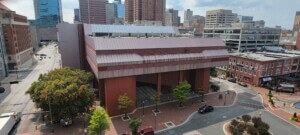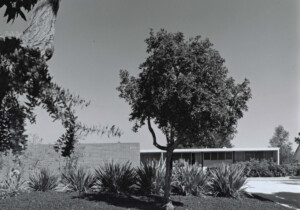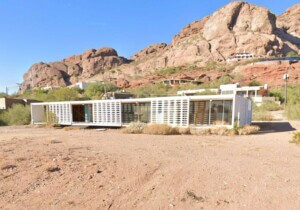The old Ford Motor Company assembly plant, a hulking presence on downtown Jacksonville’s riverfront since 1924, is officially bulldozer-bound following the city’s recent approval of a demolition request filed by the property’s owner.
The proposed demolition of the historic industrial building, designated as a local landmark in 2003, has been a hot-button issue in Florida’s largest city as preservation groups rallying to save it from destruction. Perched alongside the St. Johns River in the shadow of the Mathews Bridge, the Albert Kahn–designed structure has made regular appearances on the Jacksonville Historical Society’s annual list of endangered buildings.
Demolition plans filed by property owner Amkin Hill Street LLC, a holding company of Miami real estate developer Ramon Llorens, were previously denied by the Jacksonville Historic Preservation Commission. As detailed by the Florida Times-Union, Amkin Hill then appealed with the city’s Land Use and Zoning Committee, with members unanimously voting to reverse the previous decision and allow demolition at the site to proceed.
Amkin Hill argued that the 169,000-square-foot former factory building at 1900 Wambolt Street is in such a state of disrepair that razing it is the only path forward in opening up a prime riverfront parcel to new economic activity, namely ship repair activities, with the potential to bring 300 new jobs to the site following its redevelopment. The developer reportedly tapped a structural engineer and an architect to study the riverfront structure and assess whether existing damage would hinder attempts to repurpose all or part of it. They ultimately determined that rehabilitation wasn’t viable.
“Millions have been invested in this property, including in the analysis of the ability to rehabilitate the building,” the appeal explained. “It cannot be done. The property cannot be economically developed without the demolition of the building.”
“It was fairly clear that this was not a salvageable facility,” the Times-Union reported City Council member Michael Boylan as saying of the committee’s decision to allow demolition work to proceed. “It was the right thing to do.”
Amkin Hill acquired the old Ford plant in 2015 as part of a larger $4.4 million purchase of eight adjacent properties spanning 35 acres along the St. Johns River in the Talleyrand section of Jacksonville.
Custom-built for the assembly of Model Ts and later transitioning to Model A production, Jacksonville’s former Ford assembly plant is just one of over a thousand structures designed by German-born Detroit architect-innovator Kahn for the automaker. The 10-acre Jacksonville facility is unique, however, in that it was erected as one of 16 smaller satellite plants based on Kahn’s (revolutionary-at-the-time) single-story, steel-framed factory design perfected at the massive Rouge River complex in Dearborn, Michigan. Notably, the building, a hulking reinforced concrete structure partially perched overwater atop several thousand wooden piles, is also the only Ford factory ever built in Florida. As planner and Jacksonville historian Ennis Davis wrote earlier this year in a history of the site published by the The Jaxson, the mighty Jacksonville complex was “said to be one of Ford’s most modern contemporaneous assembly plants in the country” for Model T production when it first went online in 1924.
Employing hundreds of people during its heyday, the building’s function as an auto assembly plant was relatively short-lived with production winding down during the Great Depression. It was later used as a distribution hub for Ford and a boat manufacturing facility at different points in time. In recent years, however, the structure has sat vacant and deteriorating.
“We have a building that it’s essentially near 100 years old at this point,” Davis later explained to First Coast News following Jacksonville City Council’s endorsement of the demolition plans. “And if you don’t maintain it, it starts to decay. The wood posts that support the build are now in the process of failing. Unless you have significant money put into restoring, and bringing back at some point, it will fall into the river.”
News of the forthcoming demolition comes just weeks after the City of Detroit officially began razing sections of the old Packard Automotive Plant, an earlier and similarly cutting-edge Kahn project that first opened on the city’s east side in 1903. The move followed a drawn-out legal scuffle between the city and the site’s owner; the move to begin demolition was widely celebrated by Detroit elected officials and residents given that the sprawling Packard complex, although emblematic of Motor City, stood as a long-abandoned eyesore and threat to public safety.
Back in Jacksonville, Amkin Hill has agreed to allow the Ford Motor Company assembly plant to be extensively photographed and documented for historical purposes before demolition work gets underway.











